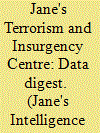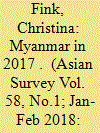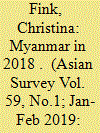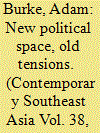| Srl | Item |
| 1 |
ID:
156014


|
|
|
| 2 |
ID:
160406


|
|
|
|
|
| Summary/Abstract |
During its second year in office, Myanmar’s NLD government made little progress on its agenda to restore peace, reduce the role of the military in politics, and raise standards of living for the poor. Instead, the dominant issues were the security crisis in Rakhine State and the exodus of half the Rohingya population.
|
|
|
|
|
|
|
|
|
|
|
|
|
|
|
|
| 3 |
ID:
164959


|
|
|
|
|
| Summary/Abstract |
The Rohingya crisis cast a long shadow over Myanmar in 2018, and prospects for the Rohingya refugees in Bangladesh were bleak. The peace process with ethnic armed organizations remained stalled. Myanmar signed major investment agreements with China that could have a dramatic effect on the economy.
|
|
|
|
|
|
|
|
|
|
|
|
|
|
|
|
| 4 |
ID:
146703


|
|
|
|
|
| Summary/Abstract |
Violence in Rakhine State of Myanmar in 2012 and 2013 caused up to 1,000 deaths and forced the long-term displacement of entire communities. Using evidence from interviews, media coverage and secondary literature, this article explores recent events and considers contextual factors behind the unrest. The conflict is a symptom of long-term historical tensions between Rakhine Buddhists and Muslims, and contemporary political changes that reinvigorated anti-Muslim sentiment across Myanmar. Rigid ethnic classifications that are enshrined in Myanmar’s laws and political system have encouraged territorial attitudes and furthered discrimination against Muslims and others perceived as migrants. This environment generates incentives for local politicians to strengthen group identity and present themselves as the guardians of their electorate. Raised tensions and a background of violence made it easier for Rakhine politicians to promote identity-based voting and to ensure that most Muslim voters in Rakhine State were disenfranchised, paving the way for some local success in the national elections of November 2015. Following the elections, Aung San Suu Kyi’s new government indicated that past policies would continue, disappointing those hoping for rapid change and demonstrating the entrenched nature of Rakhine State’s problems.
|
|
|
|
|
|
|
|
|
|
|
|
|
|
|
|